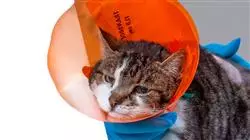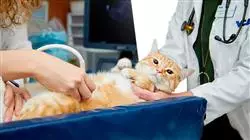University certificate
The world's largest faculty of veterinary medicine”
Introduction to the Program
Discover the latest advances in feline neoplasms in feline neoplasms, urinalysis and design of fluid therapy plans"

A thorough update in the management of the hospitalized cat can be a key differential factor to address more accurately both urinary and oncologic pathologies. The more frequent appearance of feline patients with these ailments makes it more urgent than ever to incorporate advances in diagnosis and monitoring as well as in the various treatments, including the necessary surgical interventions.
Thus, the teaching team in charge of this Postgraduate diploma brings together a series of up-to-date skills and competencies for the veterinary specialist, based both on the most recent scientific postulates and on their own practical experience. The union of these two visions makes it a more enriching academic experience from the very beginning, allowing the incorporation into practice of the developments taught throughout the program.
A Postgraduate diploma withTECH's characteristic 100% online format, in which it is the specialist who decides how to distribute the entire course load. For this purpose, all the study material is provided from the first day and can be downloaded from any device with an internet connection. There are no fixed classes or schedules, having total flexibility to combine both academic and professional and personal facets in a program that comprehensively promotes the update in urinary pathologies, oncology and critical care of the feline patient.
You will have the quality endorsement of a teaching team with extensive experience in the area and care of feline patients with all kinds of pathologies"
This Postgraduate diploma in Feline Urinary System Pathology and Oncology. Hospitalization and Critical Care contains the most complete and up-to-date scientific program on the market. The most important features include:
- The development of case studies presented by experts in Feline Medicine and Surgery
- The graphic, schematic, and practical contents with which they are created, provide scientific and practical information on the disciplines that are essential for professional practice
- Practical exercises where self-assessment can be used to improve learning
- Its special emphasis on innovative methodologies
- Theoretical lessons, questions for experts and individual reflection work
- Content that is accessible from any fixed or portable device with an Internet connection
Incorporate into your daily practice the most recent protocols for chronic renal damage, resuscitation of felines in cardiorespiratory arrest, and pain control caused by neoplasms”
The program includes, in its teaching staff, professionals from the sector who bring to this program the experience of their work, in addition to recognized specialists from prestigious reference societies and universities.
The multimedia content, developed with the latest educational technology, will provide the professional with situated and contextual learning, i.e., a simulated environment that will provide immersive education programmed to learn in real situations.
This program is designed around Problem-Based Learning, whereby the professional must try to solve the different professional practice situations that arise during the academic year. For this purpose, the student will be assisted by an innovative interactive video system created by renowned and experienced experts.
You will have access to top-quality didactic material, made up of audiovisual and complementary resources compiled by the teachers themselves"

You decide how to distribute the entire academic program, without having to sacrifice professional or personal aspects"
Why study at TECH?
TECH is the world’s largest online university. With an impressive catalog of more than 14,000 university programs available in 11 languages, it is positioned as a leader in employability, with a 99% job placement rate. In addition, it relies on an enormous faculty of more than 6,000 professors of the highest international renown.

Study at the world's largest online university and guarantee your professional success. The future starts at TECH”
The world’s best online university according to FORBES
The prestigious Forbes magazine, specialized in business and finance, has highlighted TECH as “the world's best online university” This is what they have recently stated in an article in their digital edition in which they echo the success story of this institution, “thanks to the academic offer it provides, the selection of its teaching staff, and an innovative learning method aimed at educating the professionals of the future”
A revolutionary study method, a cutting-edge faculty and a practical focus: the key to TECH's success.
The most complete study plans on the university scene
TECH offers the most complete study plans on the university scene, with syllabuses that cover fundamental concepts and, at the same time, the main scientific advances in their specific scientific areas. In addition, these programs are continuously being updated to guarantee students the academic vanguard and the most in-demand professional skills. In this way, the university's qualifications provide its graduates with a significant advantage to propel their careers to success.
TECH offers the most comprehensive and intensive study plans on the current university scene.
A world-class teaching staff
TECH's teaching staff is made up of more than 6,000 professors with the highest international recognition. Professors, researchers and top executives of multinational companies, including Isaiah Covington, performance coach of the Boston Celtics; Magda Romanska, principal investigator at Harvard MetaLAB; Ignacio Wistumba, chairman of the department of translational molecular pathology at MD Anderson Cancer Center; and D.W. Pine, creative director of TIME magazine, among others.
Internationally renowned experts, specialized in different branches of Health, Technology, Communication and Business, form part of the TECH faculty.
A unique learning method
TECH is the first university to use Relearning in all its programs. It is the best online learning methodology, accredited with international teaching quality certifications, provided by prestigious educational agencies. In addition, this disruptive educational model is complemented with the “Case Method”, thereby setting up a unique online teaching strategy. Innovative teaching resources are also implemented, including detailed videos, infographics and interactive summaries.
TECH combines Relearning and the Case Method in all its university programs to guarantee excellent theoretical and practical learning, studying whenever and wherever you want.
The world's largest online university
TECH is the world’s largest online university. We are the largest educational institution, with the best and widest online educational catalog, one hundred percent online and covering the vast majority of areas of knowledge. We offer a large selection of our own degrees and accredited online undergraduate and postgraduate degrees. In total, more than 14,000 university degrees, in eleven different languages, make us the largest educational largest in the world.
TECH has the world's most extensive catalog of academic and official programs, available in more than 11 languages.
Google Premier Partner
The American technology giant has awarded TECH the Google Google Premier Partner badge. This award, which is only available to 3% of the world's companies, highlights the efficient, flexible and tailored experience that this university provides to students. The recognition as a Google Premier Partner not only accredits the maximum rigor, performance and investment in TECH's digital infrastructures, but also places this university as one of the world's leading technology companies.
Google has positioned TECH in the top 3% of the world's most important technology companies by awarding it its Google Premier Partner badge.
The official online university of the NBA
TECH is the official online university of the NBA. Thanks to our agreement with the biggest league in basketball, we offer our students exclusive university programs, as well as a wide variety of educational resources focused on the business of the league and other areas of the sports industry. Each program is made up of a uniquely designed syllabus and features exceptional guest hosts: professionals with a distinguished sports background who will offer their expertise on the most relevant topics.
TECH has been selected by the NBA, the world's top basketball league, as its official online university.
The top-rated university by its students
Students have positioned TECH as the world's top-rated university on the main review websites, with a highest rating of 4.9 out of 5, obtained from more than 1,000 reviews. These results consolidate TECH as the benchmark university institution at an international level, reflecting the excellence and positive impact of its educational model.” reflecting the excellence and positive impact of its educational model.”
TECH is the world’s top-rated university by its students.
Leaders in employability
TECH has managed to become the leading university in employability. 99% of its students obtain jobs in the academic field they have studied, within one year of completing any of the university's programs. A similar number achieve immediate career enhancement. All this thanks to a study methodology that bases its effectiveness on the acquisition of practical skills, which are absolutely necessary for professional development.
99% of TECH graduates find a job within a year of completing their studies.
Postgraduate Diploma in Urinary System Pathology and Feline Oncology. Hospitalization and Critical Care.
Urinary system pathologies in cats are conditions that can affect the kidneys, bladder, urethra and other related organs. Some of the most common pathologies are urinary tract infections, urethral obstruction, urolithiasis and chronic renal failure. To treat these pathologies of the urinary system in cats, the veterinarian will evaluate the animal's condition and establish a treatment plan that will depend on the specific condition. In some cases, antibiotics may simply be prescribed to treat a urinary tract infection, while in other cases, hospitalization and critical care may be required to treat an obstruction of the urethra or chronic renal failure.
Hospitalization and critical care may include continuous monitoring of the animal's health, administration of intravenous fluids and diuretics to help reduce swelling and pressure on the kidneys, and bladder catheterization to provide urine drainage when bladder or urethral problems occur. In addition, surgery may be required to remove bladder stones or tumors that may be causing obstructions.
As for feline oncology, it refers to the diagnosis and treatment of cancer in cats. As with pathologies of the urinary system, the treatment plan will depend on the type of cancer and the stage of the disease. Treatment may include surgery, chemotherapy and radiation therapy, and postoperative care to minimize discomfort and prevent infection.
TECH the world's largest digital university has an academic program designed to train students in the diagnosis and treatment of diseases of the urinary system and cancer in animals, especially cats, and in intensive care and hospitalization of sick animals. This program is intended for veterinarians, veterinary technicians and medical personnel in veterinary clinics and hospitals who wish to specialize in the diagnosis, treatment and care of sick animals, especially in the field of urinary system pathology and feline oncology.







